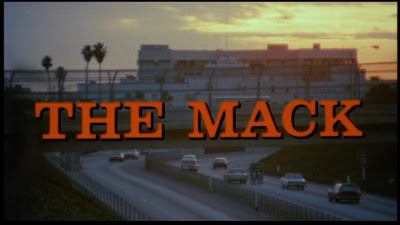 In terms of graphic design, McFarland's Film and Television Scores, 1950-1979: A Critical Survey by Genre is no Album Cover Art of Soundtracks, but as an overview of the Silver Age of film and TV score music, the same era that the excellent 1997 Little, Brown coffeetable book covered via stills of LP cover art, 1950-1979 is an informative and enjoyable read. The author is Kristopher Spencer, who runs Score, Baby!, one of my favorite soundtrack review sites.
In terms of graphic design, McFarland's Film and Television Scores, 1950-1979: A Critical Survey by Genre is no Album Cover Art of Soundtracks, but as an overview of the Silver Age of film and TV score music, the same era that the excellent 1997 Little, Brown coffeetable book covered via stills of LP cover art, 1950-1979 is an informative and enjoyable read. The author is Kristopher Spencer, who runs Score, Baby!, one of my favorite soundtrack review sites.The Silver Age saw the emergence of composers like Elmer Bernstein, Jerry Goldsmith, Ennio Morricone, John Barry, Lalo Schifrin and Quincy Jones, who managed to infuse either jazz, soul, funk or rock into their scores with aplomb and without looking desperate, like say, Frank Sinatra when he tried to rock a Nehru jacket or Ethel Merman when she cut a disco album. 1950-1979 examines their groundbreaking scores, as well as the work of actual soul or rock musicians who dabbled in film scoring (Marvin Gaye) or turned it into a full-time task (the Italian prog rock band Goblin).
Spencer has launched a blog for the purpose of posting excerpts from his book to promote it. Here are a couple of excerpts he's posted:
"[On The Taking of Pelham, One Two Three] David Shire set out to create a sound that would be 'New York jazz-oriented, hard-edged' but with a 'wise-cracking subtext to it'... The music is diabolically calculated and pulsating, yet swings like a big band from hell."
– from Chapter 1: Crime Jazz & Felonious Funk of Kristopher Spencer's Film and Television Scores, 1950-1979
"The Mack, one of the legendary blaxploitation productions due to its lethal behind-the-scenes politics and its fact-as-fiction footage of the notorious Player's Ball, features one of Willie Hutch's bold blaxploitation scores. Hutch got the job when the filmmakers offered a cameo appearance to the Hutch-produced singing group Sisters of Love. The score features some of Hutch's best songs, including the affirmative soul number "Brothers Gonna Work It Out," the stirring ballad "I Choose You" and the hard-driving theme. For The Mack's home video release in 1983, the studio foolishly replaced Hutch's score with an R'n'B-lite soundtrack by Alan Silvestri that pales in comparison."
– from Chapter 1: Crime Jazz and Felonious Funk of Kristopher Spencer's Film and Television Scores, 1950-1979
Wow, I didn't know Silvestri was involved with a butchered VHS version of The Mack. That's not the only time Hutch got the short end of the stick. A terrific, must-read 1998 Robert Wilonsky profile on Hutch mentions that his work has often been overlooked by Motown history books, despite being frequently sampled (UGK, the duo of Bun B and the late Pimp C, memorably sampled "I Choose You" for their collabo with OutKast, "Int'l Players Anthem"). In the Wilonsky article, the neglected former Motown songwriter expressed his gratitude for being sampled ("... when a guy does that, he really appreciates what you did. And that helps me as an artist, as a writer, to appreciate what I've done -- the fact that someone else respects it enough to use it like that.").
Here's an excerpt Spencer hasn't posted, about the music from a movie I watched for the first time ever over the weekend:
One of the best soundtracks of 1972, and of the blaxploitation era, is Across 110th Street, featuring music by legendary jazz trombonist J.J. Johnson, and songs performed by Bobby Womack & Peace. Hit-maker Womack's theme song boasts a memorable hook, a sweeping arrangement and a lyrical message that doesn't pull punches about organized crime and the drug epidemic. Womack also contribtes a tender ballad ("If You Don't Want My Love"), an uptempo pop number ("Quicksand"), a bit of hard funky rock ("Do It Right") and raucous feel-good soul ("Hang on in There").Selections from all three of the above soundtracks can be heard during the "Assorted Fistful" block on the Fistful of Soundtracks channel.
Little-known fact: All the black guys in this scene were fathered by Anthony Quinn.













